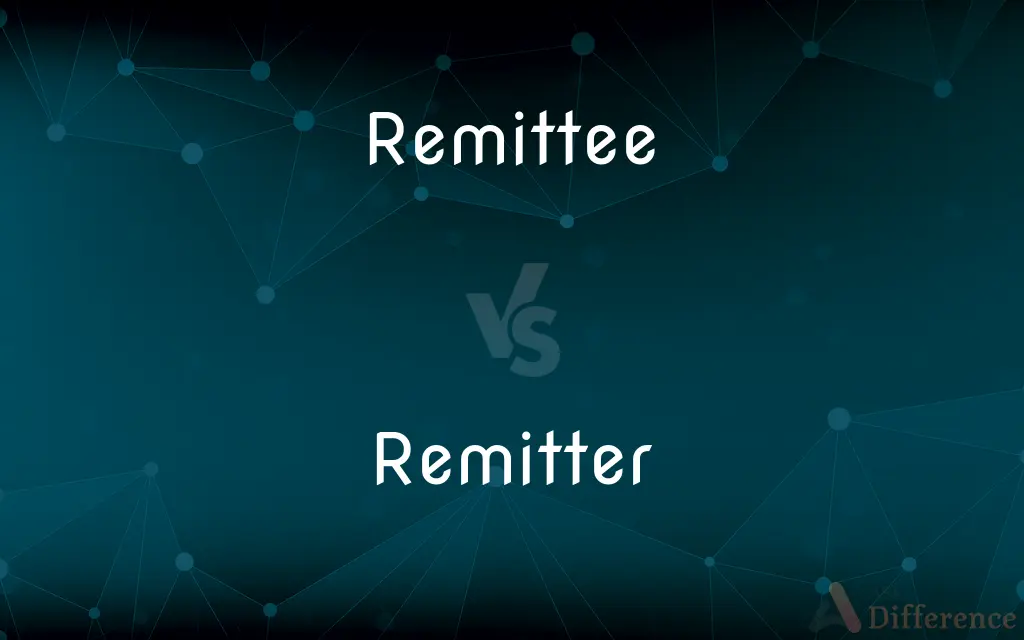Remittee vs. Remitter — What's the Difference?
By Fiza Rafique & Urooj Arif — Updated on March 26, 2024
A remittee receives funds in a transaction, while a remitter sends or transfers the funds, highlighting their roles in financial exchanges.

Difference Between Remittee and Remitter
Table of Contents
ADVERTISEMENT
Key Differences
A remittee is the party that receives money in a financial transaction. They are the beneficiaries of remittances, which can be individuals, businesses, or organizations expecting to receive payment or funds from another party. This role is crucial in financial transactions, as it ensures that the intended recipients receive the funds sent to them. On the other hand, a remitter is the person or entity that sends money, often through a bank or a transfer service. This term underscores the action of remitting payment, signifying the initiation and execution of a financial transfer from one party to another.
When discussing the process of sending money, the remitter is responsible for providing the funds to be transferred and for initiating the transaction. They might use various methods, such as electronic transfers, checks, or money orders, to send the payment. Whereas the remittee, upon completion of the transaction, is on the receiving end of this process, obtaining the funds through a bank account, cash pickup, or other receiving methods. The efficiency and security of the transaction heavily depend on the reliability of the service used and the accuracy of the provided information.
In terms of legal and financial documentation, the remitter's name and details are crucial for identifying who has initiated and funded the transaction. This information is often recorded to ensure transparency and to facilitate tracking in case of any discrepancies. Meanwhile, the remittee's details are equally significant, as they must be accurately captured to guarantee that the funds reach the correct recipient. Any errors in this information can lead to delays or loss of funds, emphasizing the importance of accuracy for both parties involved.
The relationship between the remitter and remittee is defined by the flow of funds and the purpose of the transaction. The remitter often sends money for reasons such as payments for services, support for family members, or transactions for goods. On the contrary, the remittee receives these funds as income, support, or payment, depending on the context of the transaction. This dynamic showcases the interconnected roles they play in the broader financial ecosystem.
While the roles of remitter and remittee are fundamentally opposite, they are both essential to the completion of a financial transaction. The remitter's action of sending funds is complemented by the remittee's reception of these funds, making each role indispensable in the process of remittance. This interdependence ensures the successful transfer of funds across different geographies and financial systems, facilitating global commerce and personal financial support.
ADVERTISEMENT
Comparison Chart
Role in Transaction
Receives money
Sends money
Primary Action
Receiving funds
Initiating and executing payment
Examples
Individual beneficiaries, companies, NGOs
Individuals, employers, customers
Information Required
Accurate receiving details
Accurate sending details
Purpose
To obtain payment, support, or income
To pay for services, support family, or buy goods
Compare with Definitions
Remittee
Recipient of remittances.
Families abroad often act as remittees for workers sending money home.
Remitter
Sender in a transaction.
The business acted as the remitter for the international payment.
Remittee
The party receiving funds.
The charity was the remittee of the fundraising event's proceeds.
Remitter
The party sending funds.
She was the remitter of the monthly support payment to her family.
Remittee
Beneficiary in a financial transaction.
As the remittee, he received the overseas support payment.
Remitter
Individual initiating a financial transfer.
As the remitter, he filled out the transfer form carefully.
Remittee
End receiver in payment systems.
The freelancer was listed as the remittee for the project payment.
Remitter
Entity initiating remittances.
The NGO served as the remitter for aid funds to the disaster-struck area.
Remittee
Entity or person receiving payment.
The utility company is the remittee of monthly bill payments.
Remitter
Person responsible for payment.
Tenants are often the remitter for rental payments.
Remittee
The person to whom a remittance is sent
Remitter
To transmit (money) in payment.
Remittee
One to whom a remittance is sent.
Remitter
To refrain from exacting (a tax or penalty, for example); cancel.
Remitter
To pardon; forgive
Remitted their sins.
Remitter
To restore to a former condition or position.
Remitter
To refer (a case) to another court for further consideration or action.
Remitter
To refer (a matter) to a committee or authority for decision.
Remitter
To allow to slacken
The storm remitted its fury.
Remitter
To transmit money.
Remitter
To diminish; abate
The symptoms of the disease remitted.
Remitter
A matter remitted for further consideration.
Remitter
Chiefly British An area of responsibility; scope.
Remitter
One who remits, or makes remittance.
Remitter
One who pardons.
Remitter
(legal) The sending or placing back of a person to a title or right formerly held; the restitution of one who obtains possession of property under a defective title, to his rights under some valid title by virtue of which he might legally have entered into possession only by suit
Remitter
One who remits.
Remitter
The sending or placing back of a person to a title or right he had before; the restitution of one who obtains possession of property under a defective title, to his rights under some valid title by virtue of which he might legally have entered into possession only by suit.
Common Curiosities
Can the roles of remittee and remitter be performed by the same entity?
Technically, an entity could act as both in separate transactions, but not in the same transaction.
How does one become a remittee?
One becomes a remittee by being designated as the recipient of funds in a financial transaction.
Are remittees always individuals?
No, remittees can be individuals, businesses, or any entity that receives money in a transaction.
How do international laws affect remitters and remittees?
International laws impact these roles through regulations on money laundering, fraud prevention, and the limits on transfer amounts.
Is there a limit to how much a remitter can send?
Limits can vary based on the service used, country regulations, and the specific agreement between the remitter and the financial institution.
Can a mistake in the remitter's details affect the transaction?
Yes, inaccuracies can lead to delays, rejections, or misrouting of funds.
How do remitters and remittees contribute to the economy?
They facilitate the flow of money, supporting trade, personal finance, and economic stability.
Is it possible for a transaction to have multiple remittees?
Yes, a transaction can have multiple remittees, especially in cases where funds are distributed among several beneficiaries.
What information is crucial for a remitter to provide?
The remitter must provide accurate sending details, including their account information and the remittee's receiving details.
What technologies are commonly used by remitters?
Remitters commonly use online banking, mobile payment apps, and wire transfer services.
Can a remittee refuse a transaction?
Yes, a remittee can refuse a transaction, especially if the funds are from an unknown or suspicious source.
Can remittees be organizations?
Yes, organizations can be remittees in transactions such as donations, payments for services, or fund transfers.
Do remittees pay taxes on received funds?
Tax obligations for remittees depend on the laws of their country regarding income and remittances.
How are disputes between remitters and remittees resolved?
Disputes are usually resolved through the service provider's dispute resolution process or legal action, depending on the case.
What role do banks play for remitters and remittees?
Banks act as intermediaries, facilitating the secure transfer of funds between remitters and remittees.
Share Your Discovery

Previous Comparison
Chance vs. Opportunity
Next Comparison
Get vs. GotAuthor Spotlight
Written by
Fiza RafiqueFiza Rafique is a skilled content writer at AskDifference.com, where she meticulously refines and enhances written pieces. Drawing from her vast editorial expertise, Fiza ensures clarity, accuracy, and precision in every article. Passionate about language, she continually seeks to elevate the quality of content for readers worldwide.
Co-written by
Urooj ArifUrooj is a skilled content writer at Ask Difference, known for her exceptional ability to simplify complex topics into engaging and informative content. With a passion for research and a flair for clear, concise writing, she consistently delivers articles that resonate with our diverse audience.
















































